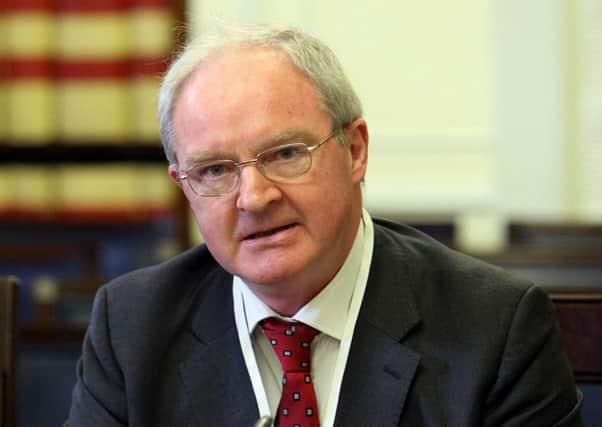Top judge: political impasse '˜caused intense frustration'


With the stalemate at Stormont now approaching 600 days, Lord Chief Justice Sir Declan Morgan said the continued lack of government is now having a real impact on people’s lives.
He also cited the urgent need to implement the Historical Institutional Abuse Inquiry’s recommendations for compensating survivors coping with old age and poor health.
Advertisement
Hide AdAdvertisement
Hide AdDelivering a speech in Belfast to mark the opening of the new legal year, he recalled comments made 12 months ago about the “political lacuna” stalling the agenda for changes to the justice system.
Initiatives requiring ministerial approval had to be held in abeyance, while others already underway were constrained by resource issues.
The judiciary had taken the lead, Sir Declan explained, so that a roadmap for reform would be ready to be presented to Executive ministers on their appointment.
He said: “Implicit in those remarks was an expectation that those responsible for giving political direction to the machinery of government would have devised a method of ensuring that those of us engaged in the provision of public services could continue to enhance and improve the quality of what we do.
Advertisement
Hide AdAdvertisement
Hide Ad“This has been a period of intense frustration and I shudder to think what message it sends to the thousands of young people leaving our shores for university or work, people that we should be trying to attract back to populate our legal and other services.”
Sir Declan used the example of historical abuse victims as an example of the real impact a lack of devolution is having on the lives of local people.
The head of Northern Ireland’s Civil Service, David Sterling, has directed the preparation of draft legislation on HIA recommendations for redress and the setting up of a special commissioner.
But nearly 20 months Inquiry chairman Sir Anthony Hart published his report in January 2017, those proposals have yet to be out into effect.
Advertisement
Hide AdAdvertisement
Hide AdSir Declan pointed out that some of those who testified about the abuse they suffered have since died or are in poor health.
Referring to the repeated calls to act on the HIA proposals, he said: “Those pleas have been supported by all of the main political parties in Northern Ireland yet today those Recommendations have still not been implemented and the human cost on those affected is increasingly severe.”
Expressing sympathy and respect for the efforts of politicians attempting to deal with Northern Ireland’s divided community, the judge also acknowledged difficulties facing civil servants responsible for day to day business and the restrictions on what they can achieve within the current legal framework.
Courts have ruled that senior officials lack the legal power to take major decisions in the absence of a Minister.
Advertisement
Hide AdAdvertisement
Hide AdSir Declan told guests at the Royal Courts of Justice how handling difficult and challenging disputes is a feature of what judges do.
If a process aimed at resolution is not possible there must be a fall-back position of a decision maker.
He added: “The provision of political direction to the machinery of government is a requirement of a functioning democracy. It is not an optional extra.”